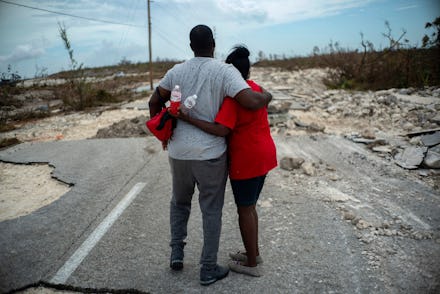The psychological repercussions of surviving a hurricane

On September 1, Hurricane Dorian pummeled the northern Bahamas with top sustained winds of 185 miles per hour and up to 25 feet of water, ranking among the strongest Atlantic hurricanes to make landfall, per the Associated Press. Over the next day, it destroyed homes, businesses, and communities. At least 50 people have died, while 1,300 or so remain missing. Luckily, the Bahamas managed to avoid the full force of Humberto — which passed the region on September 14 and has been strengthened to a Category 1 Hurricane — as it continues to recover from Dorian, CNN reports. But Dorian has also left behind less visible wreckage: the mental health effects hurricanes can have on people who live through them.
Mental health counselors have begun helping community members traumatized by Dorian, the AP reports. Pastor Robert Lockhart invited his congregation at Calvary Temple in Grand Bahama to share their experiences. Carlos Evans, 49, who uses a wheelchair, described trying not to panic as the water continued to creep upward. It took nearly two days for rescuers to retrieve him. He hoped his story would embolden others to share theirs.
Indeed, research has shown that hurricanes can wreak havoc on mental health. A study published on September 5 found that people living in England whose homes had been damaged by storms or floods had a 50% higher likelihood of poor mental health than those whose homes hadn’t sustained such damage.
Results from a study of those affected by Hurricane Harvey, which hit the Houston area from August to September 2017, were consistent with these findings; 48% of Harris County residents whose homes were severely damaged showed signs of serious psychological distress. Meanwhile, people who lacked access to medical care during Hurricane Sandy, which struck the New York area in October 2012, were more likely to display anxiety, PTSD, and depression symptoms than those who had access to medical care.
These emotional scars can persist, and current storms can re-open them. "Stress can compound upon itself,” Carrie Brown, of the North Carolina Department of Health and Human Services, explains in a video on how to cope with stress after a natural disaster. “If [people] lived through a hurricane in the past, it can bring up all of the feelings and even the physical sensations that they experienced when they survived the previous hurricane.”
Persistent worry, anxiety, and sleep issues are common during and around the time a hurricane strikes, according to the Substance Abuse and Mental Health Services Administration (SAMHSA). So, too, is the fear of a forecasted storm turning into a hurricane, despite a low risk of it doing so, as well as intrusive memories, thoughts, or nightmares tied to the storm. Frequent arguing with loved ones may also be a sign of emotional distress linked to hurricanes.
For those who are experiencing any of this, or are worried about a friend or family member who've dealt with hurricane-related trauma, there are very specific resources available. Call the 24/7, year-round, toll-free, and confidential SAMHSA Disaster Distress Helpline at 1-800-985-5990 or text “TalkWithUs” (“Hablanos” for Spanish speakers) to 66746 to speak with a trained crisis counselor if you or a friend or loved one displays these symptoms for two or more weeks. Text “TalkWithUs” to 1-212-461-4635 if you speak English and reside in US territories.
SAMSHA also has tips in English and Spanish for managing stress in the wake of a hurricane or other traumatic event, along with a list of professional mental health resources. Since navigating these resources can feel overwhelming, the agency also offers a mental health and substance use disorder services roadmap. In addition, SAMSHA has published a guide for spotting reactions to disasters or other traumatic events in kids and youth and supporting their recovery, as well as tips in English and Spanish for disaster responders to prevent and deal with stress. While experiencing a natural disaster may feel incredibly isolating, know that you’re not alone, and that support is available.